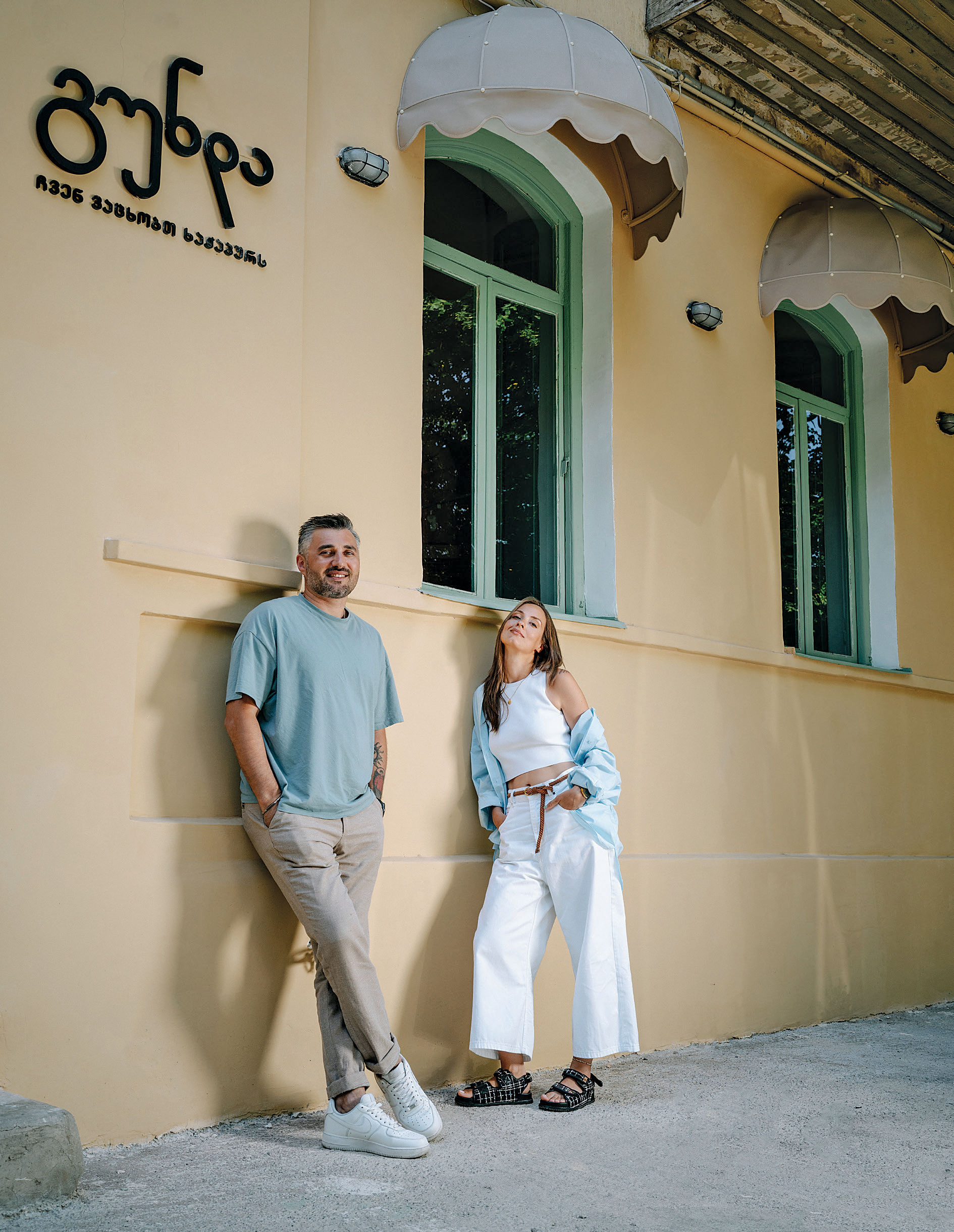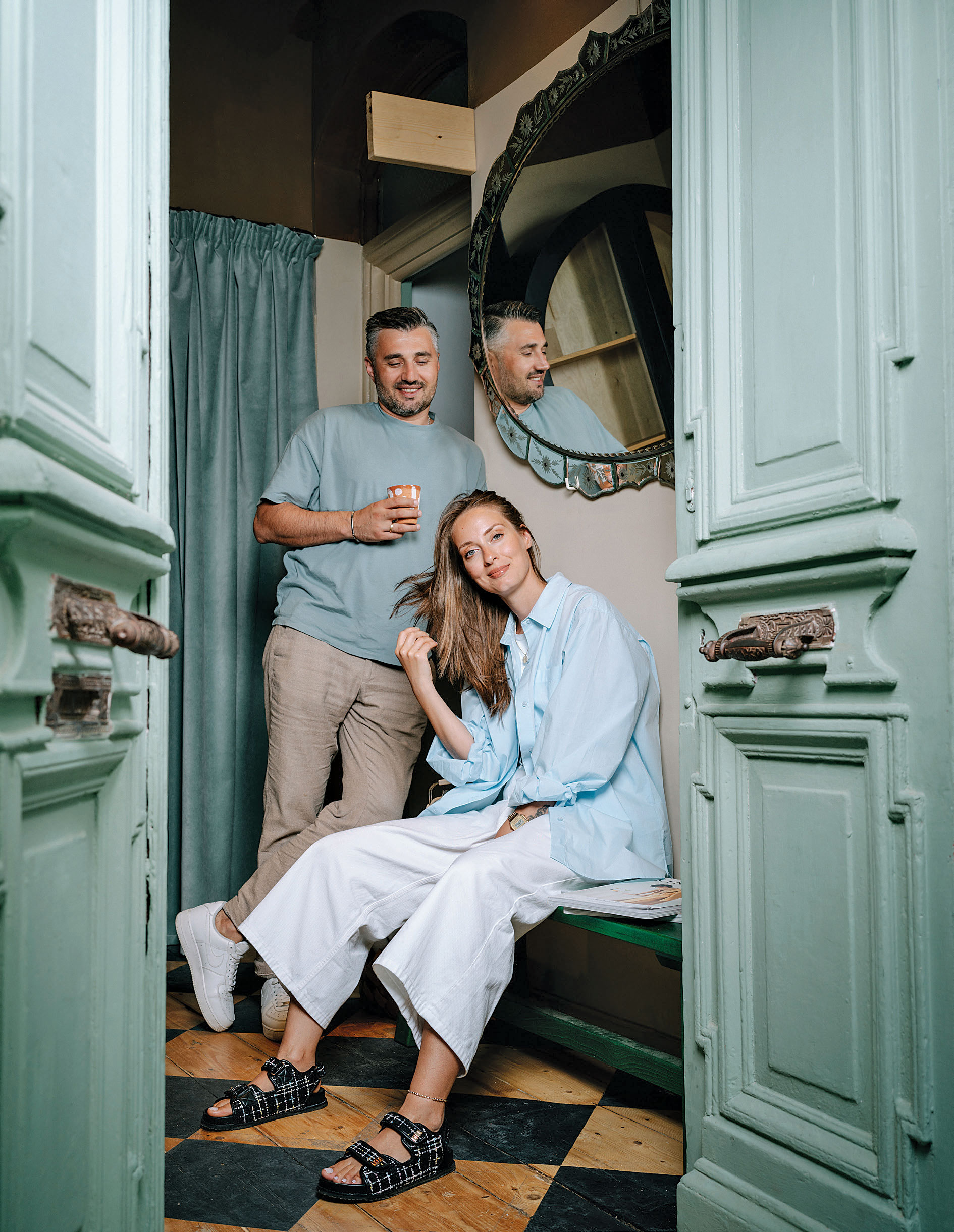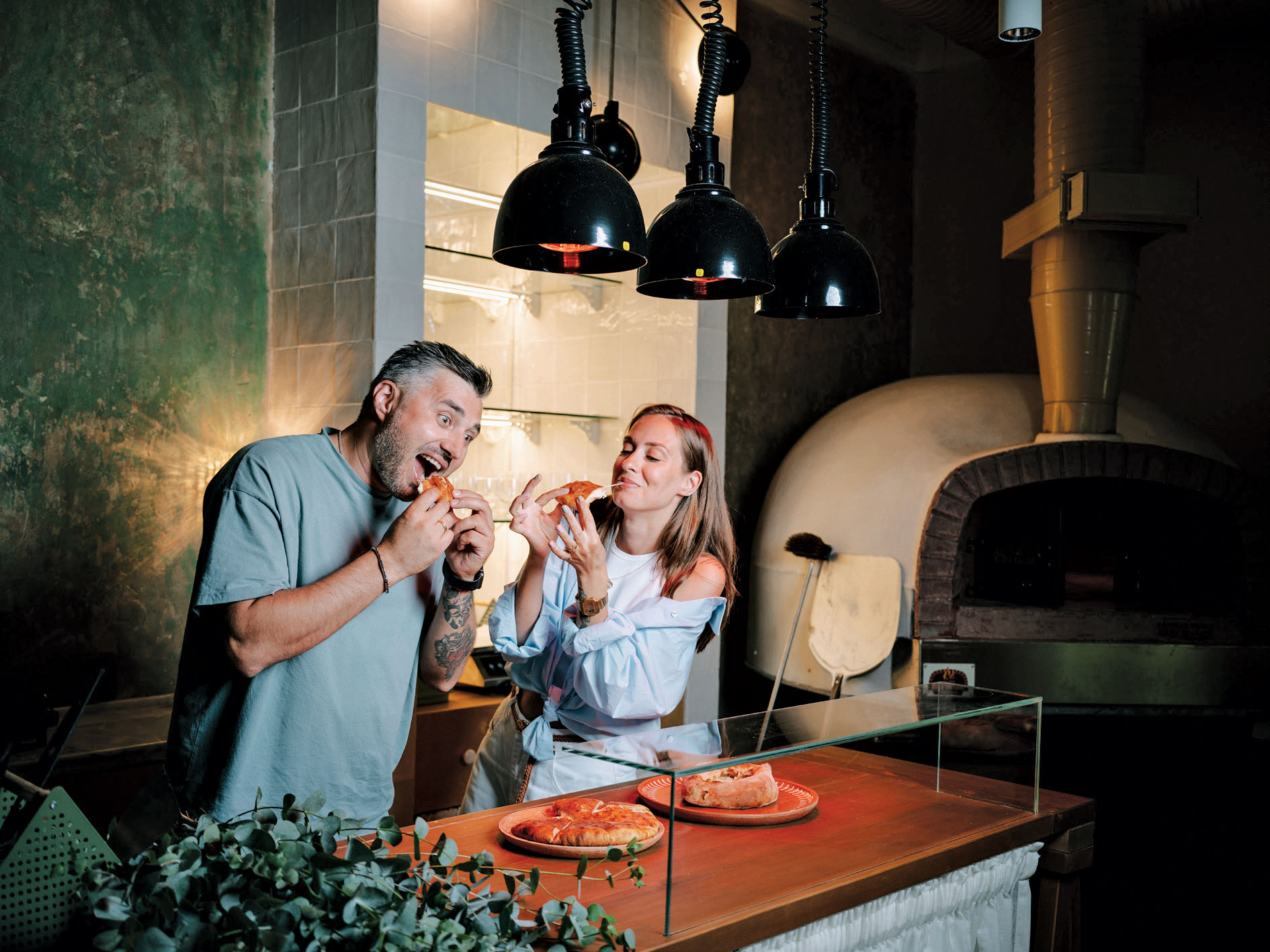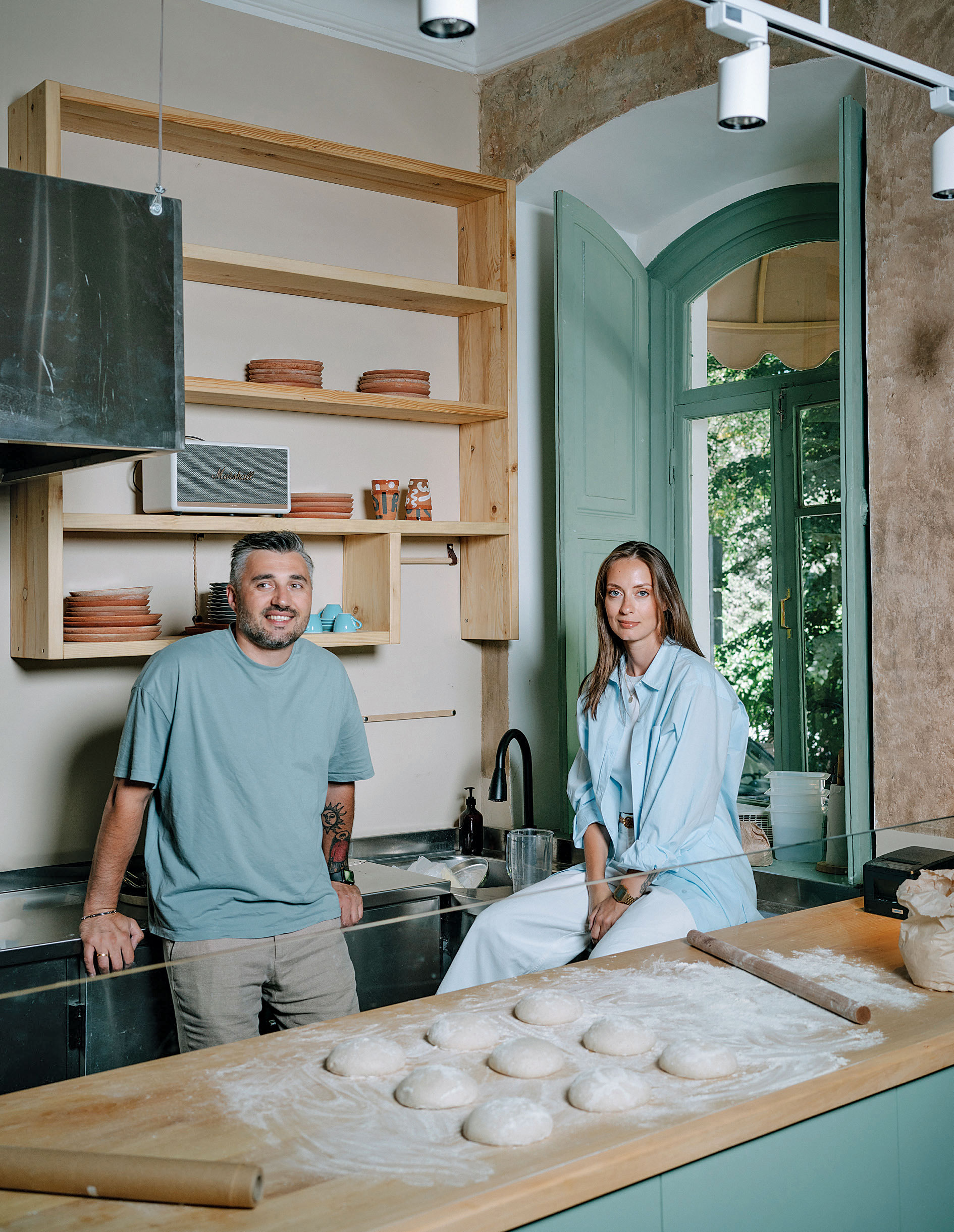Gunda is Tbilisi’s first artisan Khachapuri bakery, whose creators set out to bring the gastronomic tradition of baking Khachapuri to consumers in a completely new way.
When they started looking for a place, the main criterion was finding a building in the old part of the city with the spirit of old Tbilisi. After a long search, they found what they were looking for in a quiet neighbourhood on a narrow hill. Gunda found its home at Besiki Square N5.
The co-founders of Gunda, Levan Kokiashvili and Lali Papiashvili (Gastronaut Georgiaᵀᴹ owners) tell us that they took their first step towards building their business back in 2017 when they started researching and rediscovering khachapuri in various villages of Georgia together with their partner, Gunda co-founder dr. Nana Dolidze.
The idea of Gunda as an artisan Khachapuri restaurant does not only refer to the technology of product creation. Being an artisan means embracing the values of being natural, sustainable, hand-crafted, and beneficial to humans and the environment.

How did the idea of creating Gunda come about?
Levan: In all the countries Lali and I have visited over the years, it is striking how much power advertising and marketing have. Why is it that sushi and pizza have found a place in every metropolis, in every part of the world? It is because a lot of effort is spent on popularizing national cuisines. We have been thinking for years about the possibilities of creating a Georgian artisan Khachapuri concept network that will establish its niche in Georgia and abroad. The concept has existed for about three years. During this time, we were looking for partners.
Lali: No new generation and modern Khachapuri-oriented concepts in Georgia can be exported/presented abroad. The environment changes and people change, which makes any brand face new challenges. A brand is a living organism; to be viable, it must be based on worldwide trends and relevant realities, behavings. It’s a difficult task, “the chase without finish”, but I believe we have achieved this aim by this day, and we are not stopping developing.

What makes your new brand stand out in the market?
Levan: One of the main advantages is variety: the opportunity to taste many different Khachapuris in one space. Not everyone may want Adjarian or Megrelian Khachapuri. In Gunda, people of various characters and desires – be they family or friends – will have the opportunity to sit at the table and eat what they want most at a particular moment.
Also, In Gunda, customers can buy plain artisan dough Gundas and cheese Gundas on the spot. So they can take the ingredients and bake Khachapuri at home. Our dough is made with endemic Georgian wheat varieties, kneading at a low temperature (12 hours of slow fermentation).
And for some recipes, we studied the ancient Georgian technology of making dough (for Meskhetian Khachapuri, for e.g.). We bought special refrigerators. The dough is healthy, just like the cheese and all the other ingredients we use. We have four regional suppliers of cheese: Samtskhe-Javakheti, Svaneti, Kartli, and Kakheti. We plan to open branches abroad and hope to have our own small cheese-making enterprises there.
Lali: When we started thinking about Gunda, we saw our mission not only in baking delicious Khachapuri. The philosophy behind the brand is the need to protect the identity of Khachapuri. We did many things for this: first, a gastronomic study throughout Georgia, where we thoroughly studied the concept of Khachapuri, its origins, and various regional recipes.
Initially, we intended to open a Khachapuri bakery with an intellectually stimulated cause and purpose. Khachapuri should be adequately protected in Georgia and abroad as a national dish, so we started promoting Khachapuri as an authentic Georgian product. In 2019, Khachapuri was first recognized as a monument of Georgian culture. Our efforts aim to include khachapuri’s baking tradition in the UNESCO list of intangible cultural heritage monuments.

How many types of Khachapuri does your restaurant have?
Levan: Initially 15. In three months, we are going to increase it to 25. Some varieties of khachapuri, for example, Abkhazian, Megrelian, and Meskhetian Khachapuri, will be sold in slices to be eaten on the move. This will give the guest more choices as they can order different types of khachapuri.
While researching different types of khachapuri, we discovered that these recipes are fundamentally different: We found 14 types only in Racha-Lechkhumi. Among them is one kind of Khachapuri called Khachovani. In Kakheti, we tracked down the local Khachapuri, the heart of which is boiled together with onions, eggs, and cheese.
Lali: We will also have sweet Meskhetian Kada, sold by the slice. As well as some fasting options like Pkhlovana and Lobiani and other “heart-filled” (Gulsartiani) doughs in season on the menu.
Are you planning to open other branches?
Levan: The next branch will be opened in Saburtalo, and we will open Gunda in Batumi next season. In addition, we have already signed a contract to open a Gunda branch in New York with our US partner Inga Kvernadze. At this stage, we are looking for space in Brooklyn, and we hope that in 2023, by New Year’s, we will have the branch open.

What does artisan Khachapuri restaurant mean?
Lali: Artisan means handmade, non-industrial, and sustainable. This is a separate trend that is very popular in the world today. We use only Georgian kinds of wheat/flours we buy from Elkana farms, we know each and every product farmer/supplier personally and control each stage of Khachapuri creation from Grain-to-a Table, and we plan to use only Georgian products and wheat in all the countries we enter in the future.
Is Gunda part of the promotion of Georgian national cuisine?
Levan: Yes. Protecting our national cuisine is now more critical than ever. For example, there is a small restaurant in Lisbon called Caucasian Cuisine Restaurant. 90 percent of dishes on the menu are Georgian, and 10 percent are Caucasian. This generic name makes the origin of the dishes ambiguous.
Georgian khachapuri, I think, has great potential – about the same as pizza. Popularizing it may take many years. If there are 8,000 pizzerias in New York, even a few khachapuri restaurants will make a difference and find their place.
Lali: To imagine the danger more precisely, it is as follows: we may wake up one day and find that khachapuri is no longer a Georgian product. This is because we need an excellent means of communication and money to promote khachapuri properly. This is why including khachapuri in the list of the intangible cultural heritage of UNESCO is crucial.
